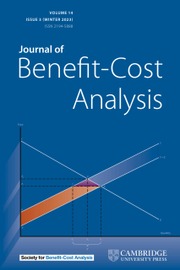Article contents
Indirect Effects in Cost-Benefit Analysis
Published online by Cambridge University Press: 19 January 2015
Abstract
The debate about the effectiveness of investments in public infrastructure initiated by Aschauer suggests that there may be substantial discrepancies between the results of conventional cost-benefit analysis and the ultimate effects of such investments on welfare. This paper takes a closer look at this issue by investigating the existence of secondary or indirect effects under conditions of monopolistic competition. We find that such effects will in general exist, and that they are potentially large, but that they can also be negative, depending on the specification of the model. With linear demand curves, indirect effects can be positive, zero or negative, with Dixit-Stiglitz they are always nonnegative and closely related to the taste for diversity, while with the logit model they are always identically zero. Free entry reinforces the positive indirect effects in the Dixit-Stiglitz model, and causes negative indirect effects in the logit model. Given this variety of results, robust empirical measurement of the indirect effects appears to be difficult.
Information
- Type
- Article
- Information
- Copyright
- Copyright © Society for Benefit-Cost Analysis 2012
References
- 6
- Cited by

